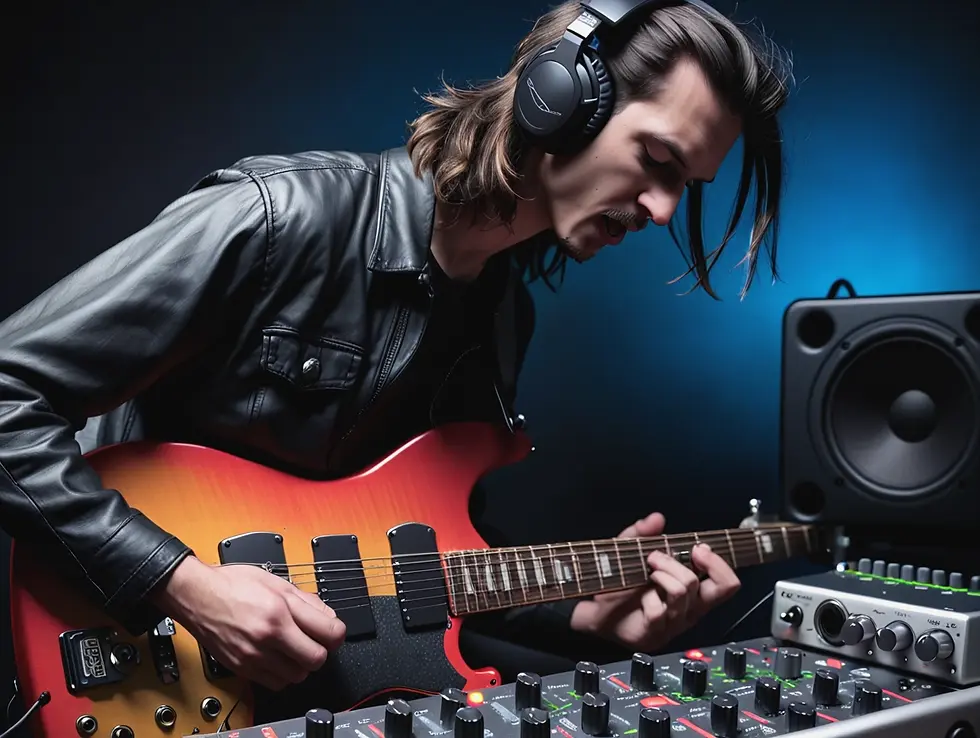Best Audio Mixers for Recording Guitar: Best Picks a Pro Sound in 2025
- Music Trendz

- Sep 15, 2024
- 4 min read
Updated: Jan 1, 2025

If you’re struggling to capture your guitar's true tone in home recordings, the best audio mixers for recording guitar can be a game-changer. Finding an audio mixer that meets your recording needs is critical, especially if your sound isn’t translating well on your tracks. Whether you need more channels, a USB interface for easy computer connection, or something simple and budget-friendly, we’ve got you covered.
The Best Audio Mixers for Recording Guitar - Top 5
Froket Audio Mixer CT-8 – Best for Budget-Conscious Guitarists
Mackie Mix5 – Best for Simple Setups
Yaeccc 4 Channel Audio Mixer with USB Interface – Best for Digital Recording
D Debra SI-8UX (8 Channel) – Best for Larger Setups
Douk Mini Stereo MC5 PRO – Best Compact Mixer
6 Crucial Considerations When Choosing A Mixer for Recording Guitar
Choosing the right audio mixer for recording guitar involves understanding your specific needs and matching them to the mixer's features. Here’s a detailed guide to help you make an informed decision:
1. Number of Channels:
For Solo Guitarists or Simple Setups: If you’re recording solo guitar or just one or two instruments, a mixer with 4-5 channels is enough. You can easily connect a microphone for vocals, your guitar, and perhaps one more instrument or effects input.
For Multi-Instrumentalists or Bands: For more complex setups, such as recording multiple instruments or a band, choose a mixer with 8 channels or more. Extra channels let you record drums, bass, and multiple guitars at the same time, without needing to swap cables or inputs during your session.

2. Size & Portability:
Compact Studios or Mobile Setups:
If space is limited or you move your gear frequently, a compact mixer like the Douk Mini Stereo MC5 PRO is a great choice. It’s lightweight, portable, and perfect for small home studios or on-the-go recording.
Permanent Studio Setup:
For a permanent studio, a larger mixer like the D Debra SI-8UX offers more features and input options but is less portable. This is ideal if you need professional-grade recordings and don’t need to move your equipment often.
3. EQ and Effects Controls:
Shaping Your Sound:
Many mixers come with built-in EQ controls that let you adjust bass, midrange, and treble frequencies. This is crucial for creating the exact sound you want, especially if your recording environment isn’t perfect.
Adding Effects:
Some mixers also include onboard effects like reverb, delay, or chorus, which can enhance your sound. However, beginners might find these overwhelming and could start with a simpler setup, adding effects later with software.
4. Preamp Quality:
Boosting Your Signal:
The preamp quality in your mixer is essential, especially for guitar recordings. High-quality preamps ensure your guitar's sound is amplified clearly without adding noise or distortion. Mixers like the Mackie Mix5 are praised for their clean, clear amplification.
5. Connectivity Options:
Balanced vs. Unbalanced Inputs:
Balanced inputs, like XLR or TRS, reduce noise and interference, giving you a cleaner sound. Ensure your mixer has balanced inputs, especially for microphones, as this will greatly improve the quality of your recordings.
Phantom Power:
If you’re using condenser microphones, make sure your mixer provides phantom power (usually +48V) to power them. Without it, you'll be limited to using dynamic microphones, which might not capture all the detail in your guitar recordings.
6. Built-in Compression:
Smoothing Your Sound:
Some mixers come with built-in compressors that help control the dynamics of your guitar playing, leveling out volume shifts and ensuring a consistent output. This is especially helpful if your playing style involves sudden changes in loudness.
Top 5 Audio Mixers for Recording Guitar in 2024
Complete Breakdown
1. Froket Audio Mixer CT-8 – Best for Budget-Conscious Guitarists
Pros: Affordable with 8 channels, great for home studios.
Cons: Lacks USB interface for direct digital recording.
2. Mackie Mix5 – Best for Simple Setups
Pros: Compact and easy to use, great preamps for clear guitar sound.
Cons: Limited to 5 channels, no USB connectivity.
3. Yaeccc 4 Channel Audio Mixer with USB Interface – Best for Digital Recording
Pros: Includes USB interface for direct connection to computers, easy digital setup.
Cons: Only 4 channels, which may not suit larger setups.
4. D Debra SI-8UX (8 Channel) – Best for Larger Setups
Pros: 8 channels for extensive recording needs, good for professionals.
Cons: More expensive and larger than other models.
5. Douk Mini Stereo MC5 PRO – Best Compact Mixer
Pros: Ultra-portable, simple to use.
Cons: Limited channels and features, best for small setups.
Common Questions on Mixers for guitarists
1. What’s the best audio mixer for beginners recording guitar?
The Mackie Mix5 is a great choice for beginners due to its simplicity, affordability, and clear sound quality.
2. Can I record guitar directly through an audio mixer?
Yes, many audio mixers, like the Yaeccc 4 Channel, offer USB interfaces for direct digital recording without the need for external interfaces.
3. How many channels do I need in an audio mixer for guitar recording?
For basic recording, 4-5 channels like the Mackie Mix5 should suffice. If you’re recording multiple instruments, opt for mixers like the D Debra SI-8UX with 8 channels.
4. Do I need a USB interface for recording guitar?
A USB interface is recommended for digital recording, especially for setups that involve connecting directly to a computer, as with the Yaeccc 4 Channel.
5. Are compact audio mixers effective for guitar recording?
Yes, compact mixers like the Douk Mini Stereo MC5 PRO can deliver quality sound in a smaller, more portable package, though they might lack some advanced features.









Comments